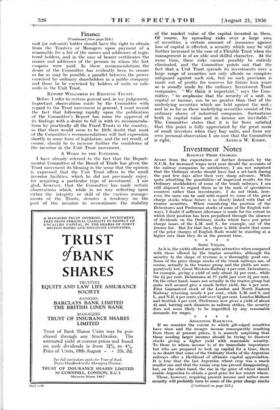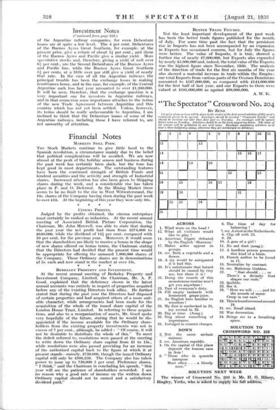Investment Notes - RAILWAY PRIOR CHARGES.
APART from the expectation of further demands by the N.U.R. for increased wages next year should the accounts of the railway companies be satisfactory, I am not surprised that the Ordinary stocks should have had a set-back during the past few days after their very sharp advance. While quite admitting the possibilities of improved results for the Ordinary stockholders of some of the trunk railways, I am still disposed to regard them as in the rank of speculative counters rather than investments. I do not think, how- ever, the same can be said with regard to some of the prior charge stocks whose future is so closely linked with that of - trustee -securities. When considering the position of the Debentures and Preference stocks of some of the English rail- ways, I doubt if sufficient allowance is made for the extent to which their position has been prejudiced through the absence of dividends on the Ordinary stocks which have put prior charge issues of the L.M. and S., for example, out of the trustee list. But for that fact, there is little doubt that some of the prior charges of English Rails would be standing at a higher rate than they do at the present time.
* * * *
SOME YIELDS.
As it is, the yields offered are quite attractive when compared with those offered by the trustee securities, although the security in the shape of revenue is a thoroughly good one.. Some of the prior charge stocks of the trunk railways are, of course, actually in the trustee group and the yields are com- paratively low, Great Western Railway 4 per cent. Debentures, for example, giving a yield of only about 31 per cent., while the 2-1 per cent. Debentures at 77- yield just over 31 per cent. On the other hand, issues not actually in the trustee group but quite well secured give a much better yield, the 4 per cent: First Guaranteed stock of the London and North Eastern Railway returning nearly 4 per cent., while L.M. and S. and L. and N.E. 4 per cents. yield over 31 per cent. London Midland and Scottish 4 per cent. Preference now gives a yield of about 4t and, barring such disasters as railway strikes, the security. does not scent likely to be imperilled by any reasonable
demands for -wages. - - s * * *
ARGENTINE RAILWAYS.
If we consider the extent to which gilt-edged securities have risen and the meagre income consequently resulting from them at present prices, it is scarcely surprising that those needing larger incomes should be trying to discover stocks giving a higher yield with reasonable security. To those to wicom income in of no immediate importance but who are prepared to lock up capital, for a time„ there is no doubt that some of the Ordinarystocks of the Argentine railways offer a likelihood of ultimate capital appreciation. It is true that the last Argentine wheat crop was a much smaller one and that the Maize crop has proved disappointing, but, on the other hand, the rise in the price of wheat should enable Argentina to obtain a good price for her winter wheat.
Those, however, requiring present income and rather more security will probably turn to some of the prior-charge stocks (Continued on page 328.)
Investment Notes
(Continued from page 326.) of the Argentine railway companies, for even Debenture issues are at quite a low level. The 4 per cent. Debentures of the Buenos Ayres Great Southern, for example,' at the present price, give a return of about 5} per cent., and those of the Buenos Ayres and Pacific give a similar yield. More speculative stocks and, therefore, giving a yield of well over 61 per cent., are the Second Debentures of the Buenos Ayres and Pacific line, while the Buenos Ayres Great Southern 51 per cents. at a little over par still give a yield of nearly that rate. In the case of all the Argentine railways the principal trouble has been the exchange losses in making remittances home, and in the case, for example, of the Central Argentine such loss last year amounted to over £1,200,000. It will be seen, therefore, that the exchange question is a very important one for investors in Argentine railways, and in that connexion some importance attaches to the terms of the new Trade Agreement between Argentina and this country which has not yet been settled. Unless, however, its terms should be really unfavourable to Argentina, I am inclined to think that the Debenture issues of some of the Argentine railways, including those I have referred to, are not unworthy of attention.







































 Previous page
Previous page